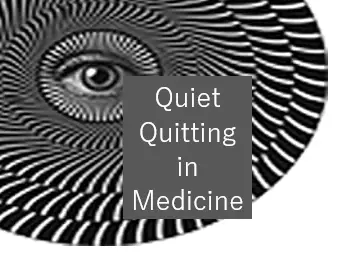Quiet Quitting in Medicine
Quiet quitting in medicine is topical, given epidemic levels of burnout in physicians.
While burnout is increasingly discussed, quiet quitting in medicine offers a new spin. Though perhaps paradoxical or contradictory, it has nothing to do with quitting patient care.
What is quiet quitting, and how are physicians affected by the trend? What about quitting quietly as a strategy for the physician burnout epidemic? Should physicians work a full FTE and nothing more?
What is Quiet Quitting in Medicine?
As physicians, we scoff at the 40-hour work week.
But what if you only worked 40 hours? If so, you’d be a quiet quitter.
A quiet quitter does the minimum expectations of the j.o.b. and not a dram (or a drachma) more. No committees or leadership. No working on notes from home. Just clock in and clock out. Do what you are paid to do, don’t volunteer for extra, and say “no” to non-remunerated duties.
Quiet quitting means working like a European (and taking your full eight weeks of vacation every year, along with the mandatory hour-long lunch away from work) rather than how you work now.
It is not quitting. It would be the new presenteeism if presenteeism had chronic burnout as a cause.
Why Quiet Quitting Right Now?
Why now? Why the public push to “just” do what you are paid to do?
It comes down to a lack of control. Physicians used to have the highest autonomy of any profession. Now, do you think you have more autonomy than our predecessors?
Why quiet quitting right now? More than ever, physicians feel out of control—of their schedule, time, and, most importantly, our sacred relationship with the patient. We are nauseous and discouraged that we cannot have better clinical relationships due to the healthcare system itself.
Finally, quiet quitting normalizes the feeling of being taken advantage of. Physicians are being squeezed from all directions.
Yet, ultimately, It provides a sense of hope, an urgent call to look for something more aligned with our actual values and beliefs.
Why else now for quiet quitting in medicine?
And Covid
The long-term effect of covid on physicians. Shell shocked, we will proceed.
And work-from-home
Amazingly underutilized in medicine.
And FI
Quiet quitting may reflect the inability to quit due to financial concerns. But, of course, with FU money, you have flexibility.
Physicians, As Cogs
Occasionally, physicians feel like cogs in the system.
This is especially true for those who work in healthcare systems where we are interchangeable in the clinic or the call schedule.
As private practice numbers decrease, we have lost control of all aspects of physician/patient interaction.
Quiet quitting is a natural response to being a W-2 employee. It is becoming like a tenured professor or a government employee. As a cog, interchangeable part, any uniqueness will be smoothed by pressure.
DPC is an option, as are other non-private insurance-based solutions.
Instead, consider the following from a doctor shortage is looming:
I wish we were more focused on changing the system so that people like me would be eager to stay.
Should We Encourage Quiet Quitting in Medicine to Mitigate Burnout?
So, we reach the important question. Should quiet quitting be encouraged to prevent burnout?
To prevent, no. Maybe go quiet if you are burnt out and a cog in the system just as a short-term play until you can better find a home for your talents.
But much more must be done to prevent physician burnout than heap a silent strike upon afflicted physicians.
The problem is systemic, so the fix must be systemic. I encourage all stakeholders to prioritize physician autonomy and mental health.
And in our medical education system, let’s discuss wellness humanely from day one. As much as non-medical education is ignored during the caldera of medical school, not to arm our future physicians with skills and send them off into a culture of certain adjustment disorders or not make physician burnout the priority it demands as an epidemic is to send our future doctors intentionally into the snake’s den of a poisoned culture.
Let’s talk about physician burnout. Let’s talk about quiet quitting in medicine. For now, as a cog in the system, it might be your best chance to change the system.
It is not about quitting caring; it is about physician autonomy.
